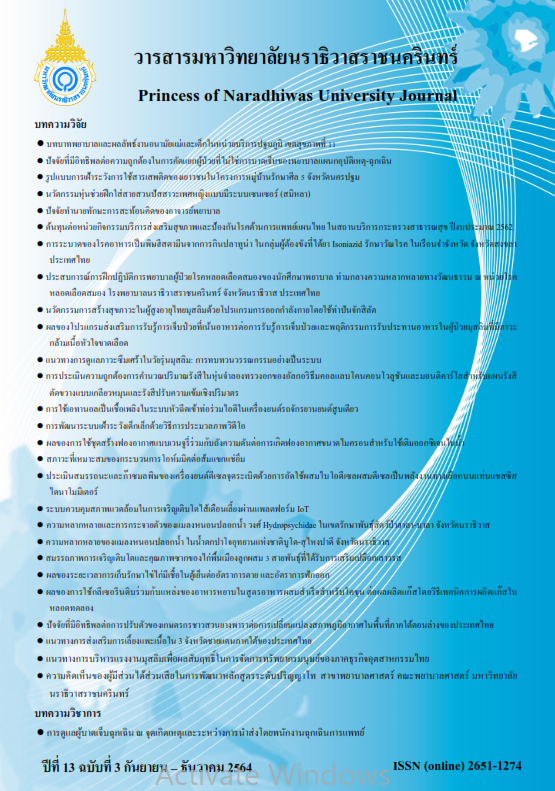ผลของโปรแกรมส่งเสริมการรับรู้การเจ็บป่วยที่เน้นอาหารต่อการรับรู้การเจ็บป่วยและพฤติกรรมการรับประทานอาหารในผู้ป่วยมุสลิมที่มีภาวะกล้ามเนื้อหัวใจขาดเลือด
คำสำคัญ:
โปรแกรมส่งเสริมการรับรู้การเจ็บป่วยที่เน้นอาหาร, การรับรู้การเจ็บป่วย, พฤติกรรมการรับประทานอาหาร, ผู้ป่วยมุสลิมกล้ามเนื้อหัวใจขาดเลือดบทคัดย่อ
การวิจัยครั้งนี้เป็นการวิจัยกึ่งทดลองมีวัตถุประสงค์ เพื่อศึกษาผลของโปรแกรมส่งเสริมการรับรู้การเจ็บป่วยที่เน้นอาหารต่อการรับรู้การเจ็บป่วยและพฤติกรรมการรับประทานอาหารในผู้ป่วยมุสลิมที่มีภาวะกล้ามเนื้อหัวใจขาดเลือด จำนวน 50 ราย คัดเลือกกลุ่มตัวอย่างแบบเฉพาะเจาะจงตามคุณสมบัติที่กำหนด โดยแบ่งเป็นกลุ่มควบคุมที่ได้รับการพยาบาลตามปกติ และกลุ่มทดลองที่ได้รับการพยาบาลตามปกติร่วมกับโปรแกรมส่งเสริมการรับรู้การเจ็บป่วยที่เน้นอาหาร ตรวจสอบความตรงตามเนื้อหาของโปรแกรมและเครื่องมือทั้งหมดโดยผู้ทรงคุณวุฒิจำนวน 3 ท่าน และทดสอบความเที่ยงของแบบสอบถามการรับรู้การเจ็บป่วย โดยวิธีการวัดซ้ำได้ค่าสัมประสิทธิ์สหสัมพันธ์ .83 และแบบสอบถามพฤติกรรมการรับประทานอาหารผู้ป่วยมุสลิมที่มีภาวะกล้ามเนื้อหัวใจขาดเลือดโดยการคำนวณหาค่าสัมประสิทธิ์แอลฟาของครอนบาคได้เท่ากับ .70 ผลการศึกษาพบว่า คะแนนการรับรู้การเจ็บป่วยและคะแนนพฤติกรรมการรับประทานอาหารในผู้ป่วยมุสลิมที่มีภาวะกล้ามเนื้อหัวใจขาดเลือดกลุ่มทดลองที่ได้รับโปรแกรมส่งเสริมการรับรู้การเจ็บป่วยที่เน้นอาหารภายหลังการเข้าร่วมโปรแกรมสูงกว่ากลุ่มควบคุมที่ได้รับการพยาบาลตามปกติ
ผลการวิจัยครั้งนี้แสดงให้เห็นว่าโปรแกรมส่งเสริมการรับรู้การเจ็บป่วยที่เน้นอาหารสามารถส่งเสริมให้ผู้ป่วยมุสลิมกล้ามเนื้อหัวใจขาดเลือดมีการรับรู้การเจ็บป่วยและมีพฤติกรรมการรับประทานอาหารที่เหมาะสม
เอกสารอ้างอิง
American Heart Association (AHA). (2016). Heart disease and stroke statistic 2016 update. Retrieve from http://www.nonocortx.com/Article/HeartDiseaseStrokeStatistic.pdf.
Broadbent, E., Petrie, K.J., Main J., & Weinmann, J. (2006). The brief illness perception Questionnaire. Journal of Psychosomatic Research, 60, 631-637.
Donovan, S.H., Ward, E.S., Song, K.M., Heidrich, M.S., Gunnarsdottir, S., & Phillips, M.C. (2007). An update on the representational approach to patient education. Journal of Nursing Scholarship, 39(3), 211-216.
Hassan, S.H. (2015). Effect of religious behavior on health-related lifestyles of muslims in Malaysia. Journal Reling Health, 54(4), 1238-1248.
Hewson, P.W. (1992). Conceptual change in science teaching and teacher education. University of Wisconsin-Madison: United States of America.
Junehag, L., Asplund, K., & Svedlund, M. (2013). Perceptions of illness, lifestyle and support after an acute myoicardial infarction. Caring Sciences, 28(2), 289-296
Kaenphueak, Y., Junprasert, S., & Asawachaisuwikorm, W. (2017). Outcomes of salf-regulation on eating behavior and brisk walk for weight control in overweight women. The Public Healthjournal of Burapha University, 9(1), 105-116.
Klinchuen, S., Pavadhgul, P., Therawiwat, M., & Imamee, N., (2015). Food consumption behavior among metabolic syndrome risk thai muslim in nongchock district, Bangkok. Jounal of Health, 38(129), 31-39.
Kongseu, P., Tantikosoom, P., & Ua-kit, N. (2014). The effect of educative supportive nursing program on dietary behaviors among patients after percutaneous transluminal coronary intervention. Kuakarun Jounal of Nursing, 21(1), 168-185.
Leventhal, H., & Cameron, L. (1987). Behavioral theories and the problem of compliance. Patient Education and Counseling, 10, 117-138.
Leventhal, H., Benyamini, Y., Brownlee, S., Diefenbach, M., Leventhal, A.E., Patrick-Miller. L., & Robitaille, C. (1997). Illness representations: Theoretical foundations. Perceptions of Health and Illness, 189, 19-45.
Lillahkul, N., & Supanakul, P. (2018). Way of life of muslim people in thailand southern provinces and health promoting life style. The Southern College Network Journal of Nursing and Public Health, 5(2), 302-312.
Makeng, M., Jittanoon, P., & Buapetch, A. (2018). The effect of Muslim-Based health behavior modification program on diabetic control behaviors and blood sugar level of uncontrolled DM Muslim patients with Co-Morbidty. Songklanagarind Journal of Nursing, 38(1), 46-62.
Margaret, E.G. (2003). Heart healthy eating self – efficacy an Effective tool for management eating behavior change intervention for Hypercholesterol. Topics in Clinical Nutrition, 18(4), 229-244.
Pattani Hospital. (2019). Statistics of myocardial ischemia patients admitted to Pattani Hospital 2017-2019. Pattani: Pattani Hospital: 2017-2019. (in Thai).
Polit, D.F., & Beck, C.T. (2012). Nursing research: Generating and assessing evidence for nursing practice (9th ed.). Philadelphia, PA: Lippincott Williams & Wikins.
Ranee. S., (2017). The effect of promoting perceived benefits and reducing perceived barriers program on eating behavior in muslim patients with coronary heart disease. Degree of master of nursing science program, Faculty of Nursing, Chulalongkorn University. (in Thai).
Songtae, J., (2011). Health behaviors contributing to risk of conteibuting to risk of coronary heart disease among thai muslim in the meesuwan 3. Master of Public Health Thesis. Health Promotion Program, Thammasat University, Bangkok. (in Thai).
Tantikosoom, P. (2010). The effect of behavioral management program on blood cholesterol in patients with coronary revascularizotion. Degree of Doctor of Philosophy Program Nursing Science, Faculty of Nursing, Chulalongkorn University. (in Thai).
Thepphawan, P., Watthnakitkrileart, D., Pongthavornkamol, K., & Dumavibhat, C., (2011). Cognitive representation, emotional responses and hospitalization experience in predicting decision making for receiving treatment among patients with acute coronary syndrome. Journal Nursing Science, 29(2), 111-119.
VanHorn, L., Caeson, J., Appel, L., Burke, L., Economos, C., & Karmally, W. (2016). Recommended Dietary Pattern to Achieve Adherence to the American Heart Association/American College of Cardiology (AHA/ACC) Guidelines. Circulation, 134, 505-529.
Yan, J., You, L., He, J., Wang, J., Chen ,L., Liu, B., & Jin,S. (2011). Illness perception among Chinese patients with acute myocardial infraction. Patient Education and Counseling, 85(2011), 398-405.
Yan, J., You, L., Liu, B., Jin, S., Zhou, J., Lin, C., & Gu, J. (2013). The effect of a telephone follow-up intervention on illness perception and lifestyle after myocardial infarction in China: A randomized controlled trial. Jounal Of Nursing Studies, 51(6), 844-855.




